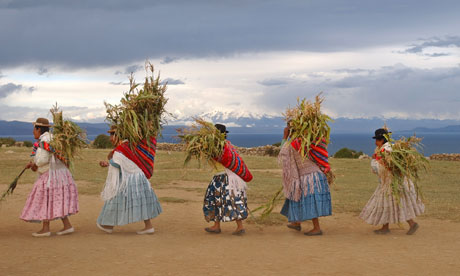
(above) Aymara indigenous people carry bundles of corn crops at the Titikaka lake, near Copacabana, Bolivia. Photograph: Dado Galdieri/AP
Will Bolivia make the breakthrough on food security and the environment?
June 20, 2011 - Guardian
Evo Morales' government is poised to pass a law that ensures Bolivians can feed themselves, and protects the environment
A new law that is being debated in Bolivia is expected to pave the way for the government of President Evo Morales to ensure food security while preserving national sovereignty and protecting the environment.
The law reflects a concept of life in Bolivia that is centred around Suma Qamaña or living well. For Bolivians, these two Aymaran words are not about Fellini's dolce vita: instead, they are about all people living well in harmony with the Pachamama, or Mother Earth.
The president is soon expected to sign the Law of Productive,
Communal and Agricultural Revolution. The government says it will invest $500m (£308m) in sustainable policies that guarantee the local and self-sufficient production of high quality food, while preserving and respecting the country's immense biodiversity.
A key part of the proposals in this "food revolution" is Bolivia's intention to produce its own seeds.
"[They] are a major factor in food production," said Carlos Romero, the minister who proposed the draft law. "But in recent years we've seen an increase in their price across the world, because of a rise in oil prices and the monopoly exercised on seeds by a few corporations. That's why we want to create state-owned companies that produce seeds."
Bolivia hasn't been immune to the global volatility of food prices. Earlier this year, for example, it had to import sugar, after shortages led prices to double and sparked protests among consumers. Prices of locally-produced indigenous food, such as quinoa, are also at a record highs: some highland communities have taken to eating rice and pasta instead of their traditional – and more nutritious – crops.
Climate change, price speculation and foreign demand have taken much of the blame, but for Demetrio Pérez, president of Anapo, an association of more than 14,000 wheat, soya and corn producers in the country's fertile eastern plains, consumers are also too reliant on imports.
"We depend too much on Argentina and Brazil," Pérez said. "So what better way to produce our own seeds? If we use the latest technology and have a good harvest, prices can go down and we can convert Bolivia into an exporting country.
However, the government has said it does not want to use the technology big business would like to embrace, for example, to modify food genetically. Ciro Kopp, an agricultural engineer at the National Council for Food and Nutrition, says that, before aiming to become a large exporter, Bolivia's priority should be to guarantee food sovereignty and security for its people.
"About 20 to 25 years ago, 70 to 80% of what we ate was produced locally in Bolivia," he said, "but then we embraced the agro-industrial model and now 70 to 80% of what we eat comes from the agro-industry, which makes us dependent on technologies and price controls from abroad. So, in the same way that industrialists received support from the government in the past, now it's small farmers who need help."
Kopp believes the country has become too dependent on monocultures, and that only by protecting the genetic make-up of its native crops from an invasion of foreign species, can Bolivians regain a diversified production and a better diet.
"Bolivia is a centre of origin of several Andean crops such as potatoes, quinoa, chili and corn," he said. "It is essential to strengthen the systems of production, natural selection and exchange of seeds that farmers have been doing for centuries. Our focus should be first of all to feed the country. If our priority is to export, what are people going to eat?"
Bolivia's representative to the UN's Food and Agriculture Organisation, Elisa Panadés, agreed that the law is a step in the right direction.
"Bolivia is creating the conditions to strengthen small producers who are the most vulnerable and affected by the isolation of where many of them live and by climate change," she said. "[They] cannot compete fairly in local, regional or global markets, because of poor road conditions and lack of access to seeds and fertilisers."
She added that supporting small farmers would improve not only food security but also their living conditions.
Bolivia has notorious institutional weaknesses. Analysts warn against repeating the mistakes of the past, when governments did not monitor food production closely enough, causing shortages and price hikes. For now, however, the general consensus is that if the new law is applied well, Bolivia could succeed in guaranteeing food security with sovereignty for its people – as well as keep its biodiversity intact.